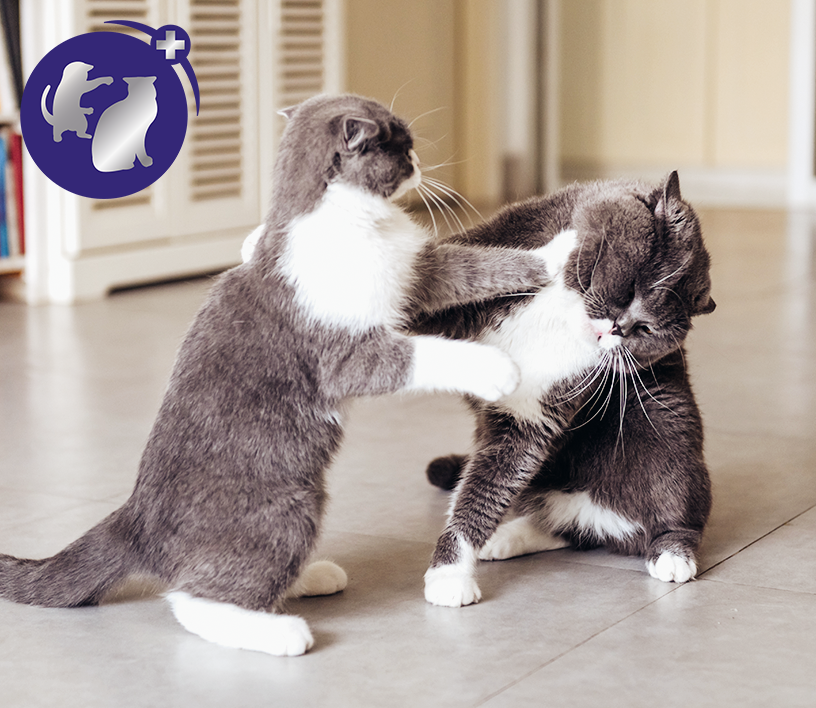
Why Do Cats Fight? Tips to Help Cats Get Along
Just like humans, cats each have their own unique personalities! As all cat owners know, our cats are individuals with their own preferences and personality traits. Some cats are extremely friendly and sociable, whereas some are more independent - we all know a kitty who needs their alone time!
As a cat parent, you may notice that your cat doesn't want to snuggle up to, or sleep near your other kitties. But in other cases you may see a kitty friendship developing quickly and easily! It takes most cats eight months to a year to develop a feline friendship. Yet while some cats will grow to love each other, some just never become friends - and it's important not to force them!
There are many reasons why your cats might not want to be purrrfect pals; cats are territorial so they may fight over space, resources, and even attention. They may also get their claws out if they feel threatened or uncomfortable! So what can you do to help your kitties get along? Luckily there are a few steps you can take to give them the best chance of a blossoming friendship.
7 TIPS TO HELP YOUR CATS GET ALONG

1. Create safe areas for new cats when they first arrive
If you're bringing a new kitty home for the first time, leave them in their opened carrier so that they can investigate the new space on their own terms. More cautious kitties may want to stay in their carrier for a while until they pluck up the courage to explore! You should keep your new cat restricted to this one room initially - soon, they'll think of this area as their safe haven. This will help them settle in without being overwhelmed.
2. Give your cats time and space to adjust
While a new cat is restricted to their safe room, be sure to visit often. Evening visits are a great time to set up daily play sessions; which will help your kitty feel more comfortable and will help you bond. Don't force your cat to interact with you; they will come to you when they are ready! Of course, be sure to still spend one-on-one time with all of your cats - at a different time of day for each. This will help keep your cats happy and relaxed and ease the introduction process. Keeping to a regular schedule will also help your cats feel in control of their day.
3. Provide your kitties with the resources they need
Any new pet's safe haven should be filled with the things they like and need. As resources can be a cause of kitty conflict, make sure each cat has their own litter tray, food, water, toys, and bedding. Before you introduce cats, check that there are plenty of separate resources for your pets. N+1 is a good rule to follow in a multicat household - one resource for each cat plus one extra!

4. Introduce your cat to the rest of the house
Once any new kitty is relaxed in their room (it may take a few days, a week, or more), you can open the door and let them explore the rest of the house! At first, you may want to make sure that any other cats are in a separate room so that they won't see one another (but will be able to sense their scent!). New cats will often investigate at night, making short explorations - then rapid retreats to their safe haven! It's normal for your cat to be hesitant while they start exploring so allow them to adapt at their own speed.
5. Introduce other cats gradually
Getting cats used to each other's scents before they actually meet is a great way to start their relationship and ensure that they can happily share a space! Swapping toys and bedding is an easy way to do this. You can also stroke one cat - including rubbing their head - and then stroke the other immediately after; transferring scents so that they can learn about each other before meeting. After a while, you can switch your cat's areas so that they are surrounded by the other's scent and get familiar with each other!
6. Be there when your cats meet!
It's essential that you're around when your cats first meet. Be sure that each cat has an easily accessible escape route to help them feel less threatened. If your cats react calmly to seeing each other or being together, smell one another or play together, this is great! You can give your furry friends treats and make a fuss over them as encouragement. If your cats are unsure, don't worry, it can take time for a friendship to occur!
7. Create a relaxing atmosphere
Use a FELIWAY Friends Diffuser before introducing any new cats to each other, during first meetings, and for at least one month after they meet, to support a calm, relaxed atmosphere. This will help the cats feel safe and secure and reduce the chance that they will see each other as a potential threat. This can also help to calm kitties who are already in conflict. Place the Diffuser in the room where your kitties spend most of their time - and in different places if your cats have separate special areas.
The length of time it takes your kitty to settle in will depend on their temperaments, previous experiences, and how many other cats (or dogs) are in the new home. Usually this will take two to three weeks, but can take several months so be patient with your kitties! Even if your cats don't become best friends, these steps can help to prevent conflict between them! Read our expert tips for spotting and relieving tension between your cats for more advice.























